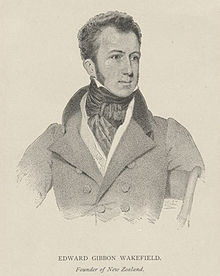- Edward Gibbon Wakefield
-
Edward Gibbon Wakefield (* 20. März 1796 in London; † 16. Mai 1862 in Wellington) war ein britischer Staatsmann, der als einer der Vertreter des Vereinigten Königreichs am Wiener Kongress teilnahm und der maßgeblich an der Kolonialisierung Australiens und Neuseelands mitwirkte.
Wakefield trat früh in den diplomatischen Dienst ein. In Turin, der Hauptstadt des Königreiches Sardinien-Piemont war er von 1814 bis 1816 als Diplomat tätig. In dieser Zeit wurde er von König Georg III. von Großbritannien zum Wiener Kongresses entsandt, um die britischen Interessen zu vertreten. Neben den Hauptvertretern Großbritanniens, Robert Stewart, 2. Marquess of Londonderry und Viscount Castlereagh, Arthur Wellesley und Robert Banks Jenkinson, spielte Wakefield aber eher eine weniger bedeutende Rolle.
Nach erneuter Tätigkeit als Diplomat in Paris von 1820 bis 1826 fiel er am englischen Hof in Ungnade. Es ging sogar so weit, dass er 1831 ins Gefängnis musste. Dort schrieb Wakefield das Manuskript zu einem Buch über die Todesstrafe. Zwei Jahre zuvor hatte er das Werk „A letter from Sydney“ verfasst, in dem er eine Theorie der Kolonialisierung entwickelte. Dieses Buch hat er 1833 in „England and America“ ausgearbeitet. Im Jahre 1849 entstand „A view of the art of colonization“. Darin schlug Wakefield vor, die Kolonien mit Freiwilligen zu besiedeln und nicht mit Strafgefangenen, wie es bisher üblich war.
Seine Ideen führten 1834 zur Gründung der South American Association, die 1836 britische Kolonie wurde. 1837 gründete Edward Gibbon Wakefield die New Zealand Association, so dass er aufgrund seiner Verdienste für dieses Land 1854 zum Mitglied der ersten gesetzgebenden Versammlung von Neuseeland wurde. Dank dieser Association stieg die Zahl der Siedler von 2000 im Jahre 1839 auf 22.000 im Jahre 1850. Dies erreichte man durch die Anwerbung freiwilliger Siedler, die als „Lockmittel“ einige Vergünstigungen erhielten.
Wikimedia Foundation.

